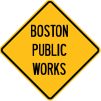For Boston Public Works' final production, playwright Laura Neubauer will be developing a new piece of work while working in collaboration with dramaturg Tyler Monroe. Laura's play, currently with the label, Play #7, will be performed at the Boston Center for the Arts, starting in May 2017. During development, Tyler and Laura will be blogging about the experience. This is the first installment.
During a cookout over Labor Day, I found myself explaining to a friend what I did as a dramaturg. I spend a substantial amount of time doing this.
"Well, I perform a variety of functions on a given production, but I identify primarily as a new play dramaturg: my job is to help support the playwright as they develop their script by providing feedback and inquiry while also making sure their vision is accurately represented on stage during the rehearsal process. Get it...?"
I must have not been very clear, since my friend sought clarity from my wife around the definition of a dramaturg a few days later. Gotta work on that water cooler explanation... But still, that's the general rule of thumb for me-- development support and playwright advocacy on a new play. That's better. Maybe I'll use that.
I have provided support on dozens of new plays through my career as a dramaturg. At this point, not much surprises me. That is, until Laura Neubauer met with me to discuss the possibility of working together on Boston Public Work's final production. Instead of needing support and feedback, Laura articulated that she wanted more of a thought partner as she developed her play. Someone to help brainstorm potential plot points and character arcs. Someone to bounce ideas off of, not react to the ideas she presented. Someone to actively talk through the play with as it crystalized in her mind.
And I was sold.
Laura and I met for our first brainstorming session over a recent weekend and spent the morning deep in conversation about her characters. It felt like, after the session, both of us got to know the five people who populate her play a whole lot better. We also discussed the major dramatic question she was seeking to answer through her story and generated a litany of potential answers to that question. It was more of a conversation than a question-answer session. By the time we concluded our work session, the play felt wide open and full of possibility to me.
It all felt so active, and providing support to a playwright can often feel reactive: they produce pages, I read and respond; they ask questions, I question back; they demonstrate need, I attempt to meet it.
Being involved in Play 7 has been a jolt to my senses as a dramaturg. It is invigorating to be so present in a process as the plot and characters take shape in front of my eyes. Laura has a sensitivity to the way she crafts human struggles, and I cannot wait for Boston audiences to witness the world she has wrought.
During a cookout over Labor Day, I found myself explaining to a friend what I did as a dramaturg. I spend a substantial amount of time doing this.
"Well, I perform a variety of functions on a given production, but I identify primarily as a new play dramaturg: my job is to help support the playwright as they develop their script by providing feedback and inquiry while also making sure their vision is accurately represented on stage during the rehearsal process. Get it...?"
I must have not been very clear, since my friend sought clarity from my wife around the definition of a dramaturg a few days later. Gotta work on that water cooler explanation... But still, that's the general rule of thumb for me-- development support and playwright advocacy on a new play. That's better. Maybe I'll use that.
I have provided support on dozens of new plays through my career as a dramaturg. At this point, not much surprises me. That is, until Laura Neubauer met with me to discuss the possibility of working together on Boston Public Work's final production. Instead of needing support and feedback, Laura articulated that she wanted more of a thought partner as she developed her play. Someone to help brainstorm potential plot points and character arcs. Someone to bounce ideas off of, not react to the ideas she presented. Someone to actively talk through the play with as it crystalized in her mind.
And I was sold.
Laura and I met for our first brainstorming session over a recent weekend and spent the morning deep in conversation about her characters. It felt like, after the session, both of us got to know the five people who populate her play a whole lot better. We also discussed the major dramatic question she was seeking to answer through her story and generated a litany of potential answers to that question. It was more of a conversation than a question-answer session. By the time we concluded our work session, the play felt wide open and full of possibility to me.
It all felt so active, and providing support to a playwright can often feel reactive: they produce pages, I read and respond; they ask questions, I question back; they demonstrate need, I attempt to meet it.
Being involved in Play 7 has been a jolt to my senses as a dramaturg. It is invigorating to be so present in a process as the plot and characters take shape in front of my eyes. Laura has a sensitivity to the way she crafts human struggles, and I cannot wait for Boston audiences to witness the world she has wrought.



